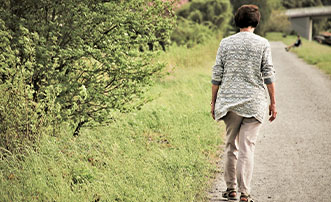According to the Alzheimer’s Association, 6 in 10 people with dementia will wander. As the brain changes during the progression of the disease, even some very important details are lost, such as the layout of their neighborhood, what their house looks like, their street name, house number, and more. This can make it difficult for someone to find their way home.
Why do people with dementia wander?
It’s important to remember that people with dementia do not wander on purpose. Oftentimes, they are searching for someone or something, pacing out of stress, fear, or boredom, or maybe they are trying to follow an old routine such as going to work or to the store.
Be prepared.
Even if your loved one with dementia has never wandered before, it does not mean they will never wander in the future. It is best to prepare in case this does happen. We all know the phrase, “Better safe than sorry.”
To start, make sure your loved one carries or wears some sort of identification. This could be an ID in a wallet, medical bracelet, labels in their clothing, etc. You may even consider a Personal Emergency Response System with a GPS component. Keep a recent photograph of your loved one on hand in case the police and/or community members need to perform a search, and a list of people to call for help.
Let neighbors know your loved one has Alzheimer’s or dementia and may wander. Have them notify you immediately if they see your loved one unattended or other suspicious activity. You can even give them tips on how to start a conversation or guide your loved one back home if they are comfortable doing so.
How do I prevent my loved one from wandering?
Thinking back to the reasons people wander will give you clues for how to prevent it. Start by trying to keep your loved one busy and engaged with activities. This could be as simple as helping with chores around the house, crafts, working on a puzzle, or chatting and connecting on the phone with family and friends. You can also clearly mark the doors in your home (ex: bathroom, bedroom, etc.) to help your loved one locate the door they are looking for.
There are some physical steps you can take at the door in attempt to keep your loved one from exiting or alert you when the door is opened. Keep your doors locked and consider a deadbolt out of eyesight (top or bottom of the door) if necessary. Other ideas include: brightly colored, large print signs such as “STOP” on exiting doors, using door alarms or an announcing system to alert you directly when the door is opened, or camouflaging the door with scenic posters or removable curtains to divert their attention away from the door.
Lastly, never leave a person with a history of wandering unattended.
And if my loved one does go missing…?
If you cannot locate your loved one, alert your local police department as soon as possible. You can start by checking in with neighbors, family, friends, and anyone on your list of people to call for help. It may be helpful to check your loved one’s favorite places to go (ex: bank, café, grocery store, etc.). Social media can be a great tool to alert the community and enlist help locating your loved one. If your loved one meets the criteria, you may issue a Silver Alert.
Visit www.silveralertwisconsin.org for more information.
Sources:
alz.org | nia.nih.gov | mayoclinic.org




